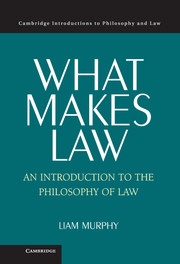6 - Law
Published online by Cambridge University Press: 05 July 2014
Summary
The Instrumental Approach
We noted in the previous chapter that political theorists and politicians prefer to have accounts of liberty, democracy, justice, and the rule of law that help persuade others to their overall point of view (Gallie 1955). The same is true for law.
The range of politically significant issues tied up with the question of what can and what cannot be counted as a ground of law is great (for further discussion, see Murphy [2001a, 2005]). Depending on whether we embrace positivism or nonpositivism, it could be argued that we the public will be more or less likely to believe that there is a prima facie duty to obey the state’s commands or believe that its rule is legitimate; will have greater or lesser respect for the state; or will be more or less concerned about the legitimacy of judges’ appealing to moral considerations in the course of making decisions. There is also a range of possible effects on legal officials of various kinds. Perhaps we get better outcomes from conscientious judges if they are not positivists (Dyzenhaus 2010); or perhaps it is the other way around.
If we are convinced that general convergence on a positivist or nonpositivist account of the grounds of law will produce one or more of these effects, and if we already have views about the desirability of these effects, that will give us a reason to wish for that convergence, and reason to urge others to reform their understanding of what law is. At least until 1961, when The Concept of Law was published, Hart was clearly thinking along these lines:
If we are to make a reasoned choice between these concepts, it must be because one is superior to the other in the way in which it will assist our theoretical inquiries, or advance and clarify our moral deliberations, or both.
(Hart 1994, 209)- Type
- Chapter
- Information
- What Makes LawAn Introduction to the Philosophy of Law, pp. 73 - 108Publisher: Cambridge University PressPrint publication year: 2014



